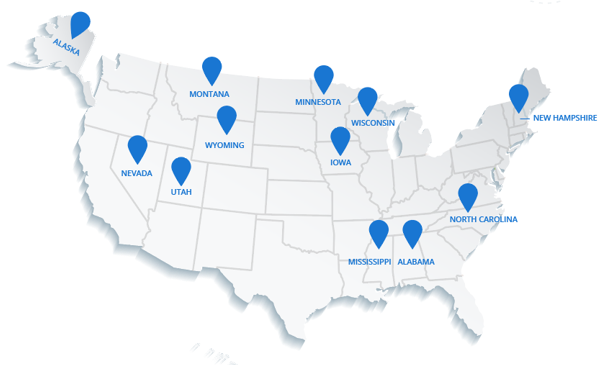We have 5 Tips for Pediatric Primary Care Leaders on Growing Successful Children for you today!
As any parent can attest to, children grow up fast. In the blink of an eye, the baby you just brought home from the hospital is now graduating from high school and leaving for college. Pediatric primary care providers have the honor and privilege of walking beside patients and families during the transitions of life from infancy to toddlerhood, school-aged years, adolescence, and into young adulthood. A large part of the role of pediatric providers during well-child checks is to support patients and families by knowing when and how to start them on the path to successful adulthood. Many are surprised to learn that laying the foundations for successful adulthood begins early in childhood. The following five tips can help serve as a guide to help Nurse Practitioners (NPs) and Physician Assistants (PAs), collectively referred to as Advanced Practice Providers (APPs), provide age-appropriate anticipatory guidance to help kids grow into successful adults.
Tip 1: Start Early
- Begin the transition to adulthood at each annual visit.
- Lay the groundwork for skills development from a young age.
- Teach children responsibilities and tasks appropriate to their developmental stage.
Tip 2: Start with Chores, Transition Responsibilities as Appropriate
- Make chores enjoyable through creative approaches like games.
- Gradually increase the complexity of chores as the child grows.
- Encourage cooking, measuring, and other activities that build skills.
Tip 3: Promote Executive Function Skills
- Discuss planning and organization in everyday activities.
- Engage children in the planning process, such as making grocery lists.
- Foster skills like attention, organization, and self-control.
Tip 4: Support Children to Choose Their Own Path
- Encourage parents to recognize and nurture their child's unique strengths.
- Discuss the importance of allowing children to choose their own career path.
- Promote positive relationships and self-esteem through understanding.
Tip 5: Provide a Variety of Learning Opportunities and Hobbies
- Encourage children to explore different hobbies and interests.
- Advocate for a diverse range of experiences to discover strengths.
- Share experiences and insights to help children find their purpose.
One of the final key elements of the healthcare provider's responsibility to help kids grow into successful adults is the ultimate transition out of the pediatric setting into adult medicine. The age at which pediatric practices will see young adults is variable—some practices will see up to 18 years old, whereas others will see through 21 or even 25, moreover, when young adults present with more adult-like chronic illnesses, such as diabetes or hypertension, many pediatric providers will attempt to transition them even earlier. Whatever the norm at your clinic or organization, it is best practice to begin to introduce the concept of transition as far as 3 to 5 years before it must be made. This gives adolescents time to warm up to the idea of moving their care and time to think about where, and with whom, they'd prefer to be followed by in the future. If you work at a clinic or hospital with multiple departments, consider working closely with family or internal medicine providers to develop a seamless transition of care. If possible, and especially in complex cases, warm hand-offs where the patient is introduced within the comfort of the pediatric setting to the adult care provider are beneficial. Furthermore, children with chronic illnesses are the most vulnerable when it comes to transitioning to adulthood. Often these medically fragile patients are delayed in finding adult care services and their health suffers as a result (Little, Odiaga, & Minutti, 2017). Providers should prioritize children with special care needs to ensure that their transition to adulthood is successful, without any gaps in care. Overall, the path to adulthood can be fraught with challenges, but children who are supported and given opportunities to grow are most likely to become the successful adult individuals they desire to be. Healthcare providers can help them achieve that goal by offering anticipatory guidance to children and their parents/guardians with these five tips in mind: start early, encourage chores, promote executive function skills, allow children to choose their path, and provide opportunities to develop strengths.
References
-
- Bandura, A. (1997). Self-efficacy: The exercise of control. New York, NY: W.H. Freeman.
- Burns, C.E., Dunn, A.M., Grady, M.A., Starr, N.B., Blosser, C.G., & Garzon, D.L. (2017). Pediatric primary care (6th ed.) St. Louis, MO: Saunders.
- Little, J. M., Odiaga, J. A. & Minnutti, C. Z. (2017). Implementation of a diabetes transition of care program. Journal of Pediatric Health Care, 215-221. http://dx.doi.org/10.1016/j.pedhc.2016.08.009.
- Lynthoctt, Haims, J. (2015). How to raise an adult: break free of the overparenting trap and prepare your kid for success. New York, NY: Henry Holt.
- Morin, A. (2014). Types of strengths in kids. Retrieved from https://www.understood.org/en/friends-feelings/empowering-your-child/building-on-strengths/types-of-strengths-in-kids
.png?width=50&height=50&name=Cube-Logo-150x150%20(1).png)
August 29, 2023




Comments